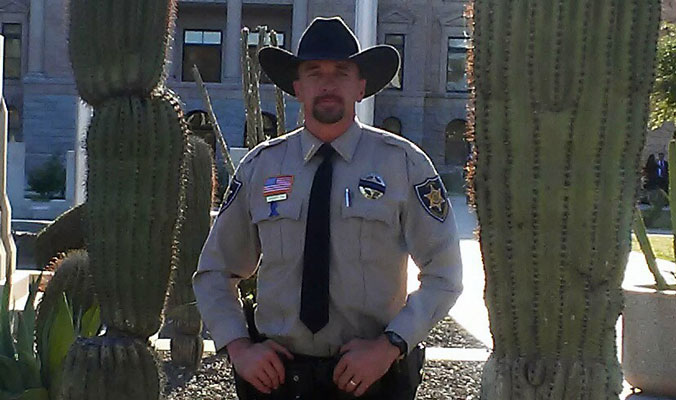Photo Courtesy Greenlee County: Greenlee County Sheriff Tim Sumner has lost his lawsuit against the Greenlee County Board of Supervisors in his bid to control his department’s finances.
By Jon Johnson
“The Board – not the Sheriff – makes the fiscal policy decisions that section 11-444 implements.”
Maricopa Superior Court Judge John Hannah
PHOENIX – No officer Tim, you aren’t the boss of everyone and you don’t set your own fiscal limits.
After nearly two years and roughly $300,000 in legal fees, the Greenlee County Board of Supervisors won a lawsuit brought against them by Greenlee County Sheriff Tim Sumner as the court ruled county sheriffs do not have the final say when it comes to funding their departments. The Sheriff declared he should be in charge of how much money the county provides for his department, and the BOS informed him that was not the case. Maricopa County Superior Court Judge John Hannah advised the law entitles those powers to the BOS and granted the Board’s cross-motion for summary judgment and Sumner’s motion for summary judgment was denied.
Judge Hannah recently issued his ruling in the case of Tim Sumner v. Greenlee County Supervisors Richard Lunt, David Gomez, and Ron S. Campbell. Sumner sued the BOS after it refused to honor his increasing monetary demands. Sheriff Sumner incorrectly believed Arizona Revised Statute 11-444 (specifically subsections (B) and (C) gave him the authority to decide how much money his office needed. Judge Hannah informed Sumner of his mistake and wrote, “Those provisions are not hidden powers that elected county sheriffs have overlooked for the past hundred years. They are obsolete 19th-century accounting rules superseded by more recent enactments that serve the same purposes more efficiently.”
Greenlee County Administrator Derek Rapier summarized the case for the BOS at its Tuesday morning meeting.
“It was his sincere belief and he argued through his attorneys that it was his responsibility to use that money as he thought was best to meet the needs of his office. And that the Board really didn’t have any say-so other than sending the monthly check,” Rapier said.
Initially, Sumner demanded an extra $104,599 per month from the BOS starting in July 2022 but did not indicate what the expenses were or why he needed the additional funds.
In April 2023 Sumner increased his “demand” to $413,007 per month, and then rounded it up to $450,000 per month starting in July 2023 and has continued to demand the extra $450,000 per month since. If granted, that would come out to an extra $5.4 million per year, which would double the entire yearly budget for the sheriff’s office. According to Greenlee County Administer Derek Rapier who summarized the case for the BOS at a meeting Tuesday, Sumner sincerely believed he should be responsible for determining how much money his department needed every month. However, that interpretation would require ignoring multiple other Arizona Revised Statutes, Rapier said.
Both sides gave oral arguments for judgment during a hearing at the Superior Court East Court Building in Phoenix on Jan. 26.
In their oratory, attorneys for the BOS declared the severe ramifications that could occur across the state had the judge ruled against them. The defendants asserted that Sheriff Sumner brought the lawsuit not because he is underfunded as the Sheriff’s Office is the highest-funded department in Greenlee County – by more than $2 million per year – but they contended Sumner filed the case so he and any other sheriff in Arizona’s other counties “can have unchecked power to spend county taxpayer funds without heeding modern budgetary requirements.”
According to the 2020 Census, Greenlee County has 9,563 residents, making it Arizona’s least populous county. The Greenlee County Sheriff’s Office budget for fiscal year 2024 is nearly $5.4 million, which is about 30 percent of Greenlee County’s general fund.
In his ruling, Judge Hannah cited case law advising it was a question of law for the court to decide. He then wrote that Sumner was “fundamentally” wrong in his assessment regarding Arizona Revised Statute 11-444 and sided with the BOS.
“The Sheriff fundamentally misreads the statute,” Judge Hannah wrote. “Section 11-444 does not empower the Sheriff to override the Board’s decisions about how much money the Sheriff can spend and what he can spend it on. It does not make the Sheriff the final authority as to what expenses are “necessary” for the performance of his duties. Read as a whole and in the context of related statutes, the statute is not a grant of authority of any kind, financial or otherwise. A different statute, A.R.S. section 11-411, sets out the Sheriff’s “powers and duties” – law enforcement, jail management, and service of process. Section 11-444 merely provides process instructions, for budgeting and payment of expenses that a sheriff incurs in the course of exercising those powers and carrying out those duties. The Board – not the Sheriff – makes the fiscal policy decisions that section 11-444 implements.”
Judge Hannah went on to advise that a variety of statutes support the Board having final fiscal authority and that “the Sheriff has none, even if the Sheriff regards a particular expenditure as necessary for the exercise of his law enforcement authority. The powers of a county shall be exercised only by the board of supervisors or by agents and officers acting under its authority and authority of law.”
While Sumner didn’t respond to an email request for comment on the case and whether he would appeal the judge’s ruling, Judge Hannah preemptively advised the Court of Appeals had already addressed the issue in a parallel case from Cochise County in 1989 and ruled in favor of the board of supervisors in that case law. Still, Sumner will have roughly two months to file an appeal if he chooses to do so. If Sumner files an appeal, it will be heard by Division Two of the Arizona Court of Appeals in Tucson.
BOS Chairman Richard Lunt expressed his desire to move forward with county business following the ruling.
“This hasn’t been fun,” Lunt said. “It’s been very troubling to this Board. This Board has always tried to do the right things. Are we perfect? No. But I think this Board appreciates what the staff did and suffered through this. You were all scrutinized and this Board appreciates that. And, hopefully, now we’ll go forward and we’ll do our tasks better. We now have direction and we have standing that we have authority to make decisions that we need to make on behalf of the county and this Board will do that.”
Sumner was represented by the law firm of Moyes, Sellers & Hendricks, with attorneys Joshua T. Greer, Natalya Ter-Grigoryan, and Nicholas J. Walter working the case, and the BOS was represented by Jones, Skelton & Hochuli P.L.C., with attorneys Georgia A. Staton and Justin M. Ackerman working the case. Both sets of attorneys hail from Phoenix and are being paid by money from Greenlee County’s general fund.










